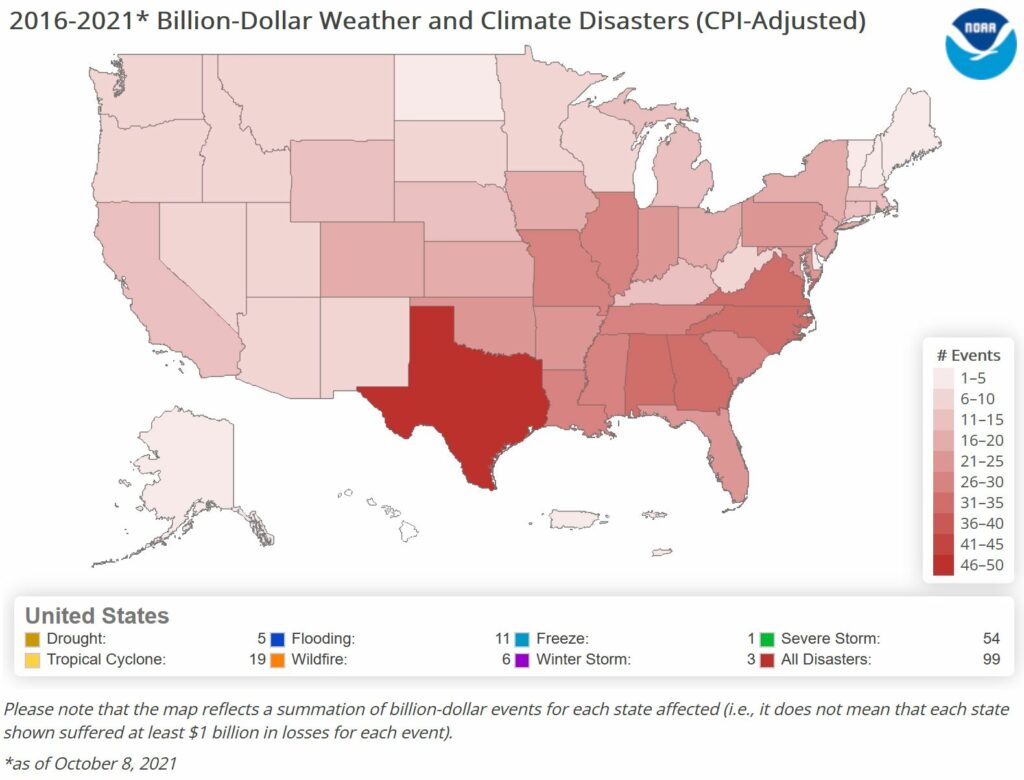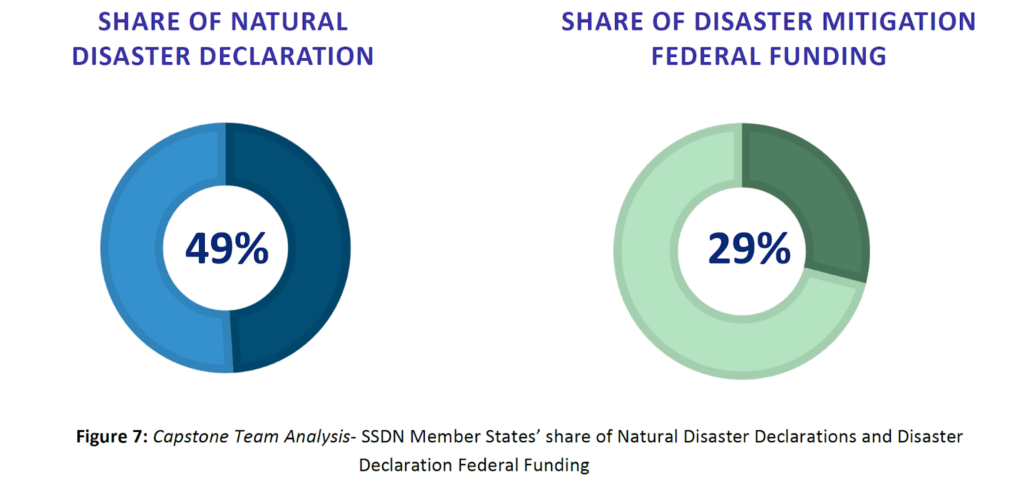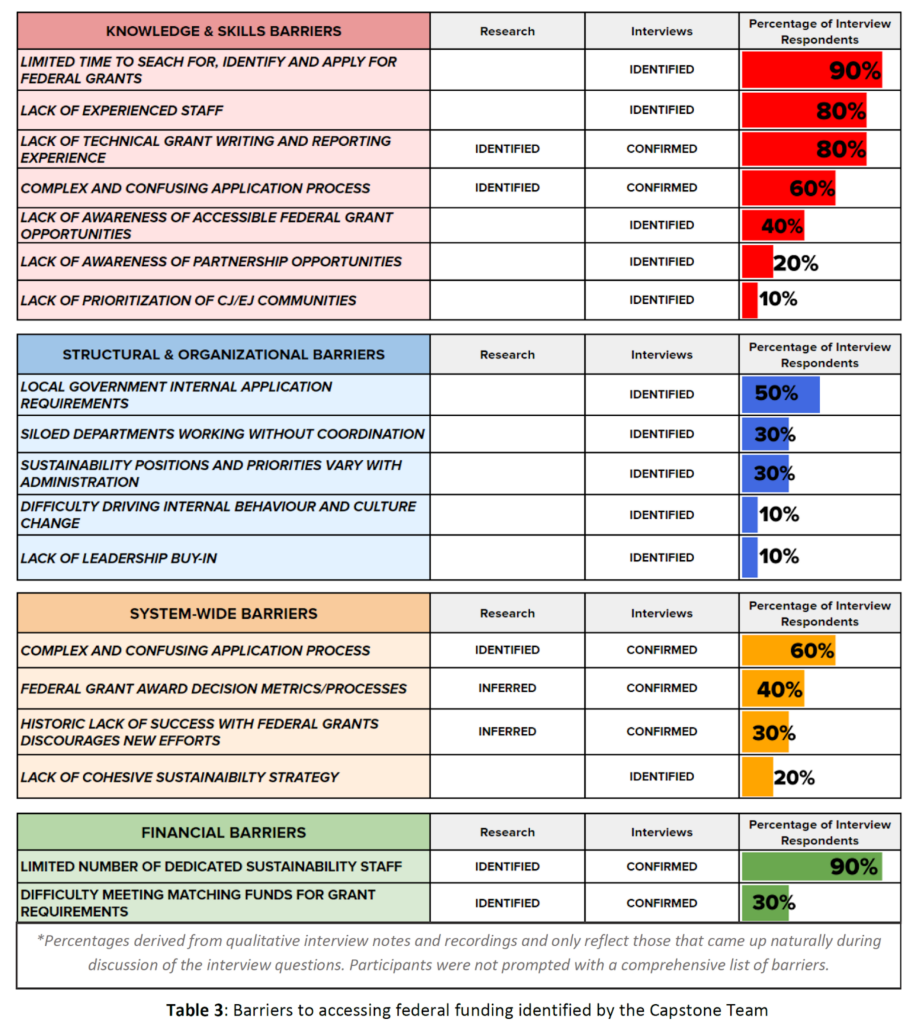Workshop Helps SSDN Members Navigate Federal Funding for Environmental Justice
The Biden Administration has put Environmental Justice front and center to help support equitable distribution of federal investment. Local governments in the Southeast have a need for targeted investment to mitigate conditions that have left many communities to experience environmental justice conditions. Columbia University Master of Sustainability Program recently hosted a Capstone Workshop to help SSDN’s Southeast Sustainable Recovery Center leverage the Administration's Justice40 efforts to better support local governments in the Southeast in accessing federal funding opportunities to support disadvantaged communities.
Federal Government’s Commitment to Justice40 Initiative
On January 27, 2021 President Biden signed Executive Order 14008 “Tackling the Climate Crisis at Home and Abroad” in which the administration made the Justice40 goal for 40% of federal investment benefits to go to “disadvantaged communities.” This commitment serves as an opportunity for the federal government to support investment in under-resourced communities as well as the alleviation of environmental justice conditions that have affected many Southeastern communities. The Columbia Student Workgroup’s final report said it best as:
“[The Justice40 Initiative] presents an opportunity for southeastern communities experiencing disproportionate climate impacts to increase their access to federal funding grants and award dollars if they have the necessary information and resources to take advantage of these opportunities. The success of the initiative is also contingent on the federal government’s successful implementation of the plan.”
Columbia University Capstone Workshop on Justice40
To undertake the research, the team first wanted to determine if there was an existing inequity in the distribution and award of federal competitive grants. The team showed the disproportionate risk of Southeastern communities, evidenced by the NOAA graphic below showing the number of Billion dollar weather disasters over the last 5 years. Their analysis of FEMA data showed that SSDN’s 10 state region in the Southeast accounted for 49% of all disaster declarations made during that period. The team found that in relation to the risk of this region there was a severe disparity in competitive awards to Southeastern communities. This disparity was exemplified in a significantly greater than average vulnerability (49% of Disaster Declarations) while receiving disproportionately low disaster mitigation funding (only 29% of funds awarded) during that same period.
 Figure 5 : Frequency distribution of Billion Dollar Disasters across the contiguous U.S. (2016-2021)
Figure 5 : Frequency distribution of Billion Dollar Disasters across the contiguous U.S. (2016-2021)

While Justice40 represents an opportunity for Southeastern communities it will only be successful if implemented appropriately by the federal agencies. In order to help understand the disparity in historic allocations, the Columbia team interviewed more than a dozen member government officials and non-profits to better understand the challenges and impediments to local government action around environmental justice. Through interviews with over a dozen local governments and community non-profits the team identified a series of barriers for Southeastern communities to effectively access federal funding opportunities pursuant to the Justice40 Initiative.

The Columbia team found that SSDN’s SSRC provides an important service to sustainability leaders in the Southeast. That even in its short tenure, members recognized the value and benefited from the increased awareness about federal funding opportunities. As the Justice40 initiative is implemented, and as legislation that invests in sustainability programs are passed by Congress (such as the Infrastructure Investment and Jobs Act), there is increased responsibility and opportunity for SSDN’s SSRC to “tailor its resources to meet the moment and help more members, especially those with the highest need, to overcome federal funding barriers.” This is particularly true in assisting members to view needs and priorities through Justice40. To help SSDN accomplish this, the Workgroup of Columbia students came up with a series of recommendations and strategies, including:
- Defining and Leveraging Member Environmental Justice Priorities
- Expanding SSDN’s Position as an Educator and Knowledge Builder
- Collaborating with Community Partners for Systemic Change
- Considering Future Engagement Opportunities
To better illustrate how SSDN could accomplish these recommendations and further support members, the team conducted a case study for an SSDN member. This case study exemplified how both communities and SSDN could better assess how, or if, their community would be considered “disadvantaged” as well as the resulting potential effect on the competitiveness of federal financial assistance application.
Helping Members Assess Justice 40 “Disadvantaged Communities” Status
To illustrate the importance and benefit for members in using federal datasets to assess Justice 40, the Columbia Capstone team conducted a example case study for the City of Sarasota. The team used several federal datasets and models to review how the city and census tracts compared against the national baseline. This entailed using CDC’s Social Vulnerability Index, FEMA’s National Risk Index, EPA’s EJ Screen, and Department of Energy’s (DOE) Low-Income Energy Affordability Data (LEAD) to ascertain what local conditions were disproportionately affecting residents within the city compared to the national baseline.
After assessing environmental justice conditions within the city using those tools, the team prioritized the relatively higher risk “disadvantaged” categories and, after comparing to a funding matrix of potential funding streams, identified the best available opportunities for the community to pursue. This case study illustrates the factors that account for consideration of the city as a “disadvantaged community” that can help identify the grants that could be of interest to sustainability directors in SSDN's membership.
How SSDN is helping communities access federal funding opportunities and prepare for Justice40
SSDN launched the Southeast Sustainable Recovery Center (SSRC) in August 2021 to help communities in the Southeast access federal funding for sustainability projects. The SSRC focuses on increasing awareness of federal funding opportunities, supporting members in accessing those resources, and building the capacity and partnerships for long term success in the Southeast. Federal policy such as the Justice40 Initiative provide an opportunity for the federal government to help reduce the disparity in funding provided to communities and in the process build capacity for equitable sustainability in the Southeast.
As SSDN’s SSRC looks to prepare communities for Justice40 and support Member’s applications for federal funding SSDN is directly implementing several of the Capstone Workgroup’s Recommendations, including helping conduct a “member EJ screening process to identify disadvantaged communities within membership and targeting outreach to members from “disadvantaged communities” and developing a Funding Matrix to align grant opportunities with member need.
Columbia Recommendations and SSDN Strategy
- SSDN is hosting weekly “Community Office Hours” every Friday at noon: SSDN members can drop-in to talk with Michael Dexter to Learn more about current or anticipated funding opportunities including even the Infrastructure Investment and Jobs Act. Join Friday at noon (click here to join)
- SSDN is Targeting Funding Opportunities to Members: SSDN’s SSRC is now providing customized alerts for federal grants that could fund member projects. All members have to do is complete the voluntary google form and SSDN will crosswalk local projects with federal grant opportunities, screen initial grant opportunities for relevance and notify members when an applicable grant is posted and provide customized case studies, information, tools, and resources that can help a member successfully apply for funds. Members can reach out directly to Michael for more information and the link to submit project ideas.
- Collaborating with Community Partners for Systemic Change: SSDN has collaborated with the State and Federal Climate Initiative’s Southeast Policy Hub to support the development of the Climate Program Portal, a new clearinghouse of information on climate opportunities originating from the recent Bipartisan Infrastructure Law. SSDN members will soon have a more engaging and interactive opportunity to view the financial assistance opportunities from the legislation. Contact Michael Dexter to learn more.
- Considering Future Engagement and Opportunities: SSDN is helping members navigate Justice40 and the recently released White House Council of Environmental Quality’s Climate and Economic Justice Screening Tool (accessible here) that was recently released in Beta. This tool, when used in conjunction with established datasets such as EPA’s EJ Screen or DOT’s Disadvantaged Communities Dataset, can help identify overburdened communities and those communities experiencing environmental justice conditions. SSDN’s SSRC is working with members to pursue federal resources that support those communities.
You can learn more about the Columbia Capstone workshop by reading the final report HERE.
SSDN greatly thanks Columbia University team members:
Kelsey Kane-Ritsch, Aashna Aggarwal, Elizabeth Bertan, John Hodges, Sowmya Menon, Udip Ranjit, Jeff Robertson, Niki Shah, Maxwell Tetrault, and faculty advisor Kizzy Charles-Guzman.
Click here to learn more about SSDN’s Southeast Sustainable Recovery Center or email SSRC Manager Michael Dexter at michael@Southeastsdn.org